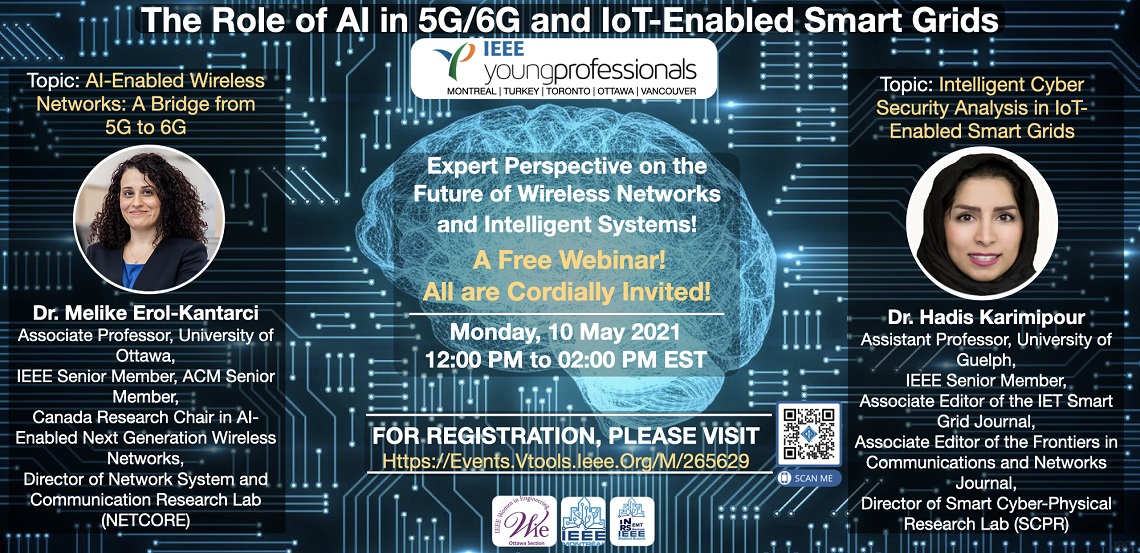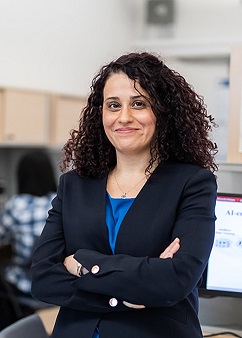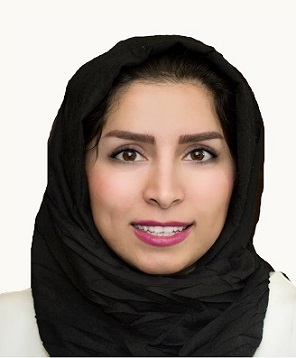The Role of AI in 5G/6G and IoT-Enabled Smart Grids

IEEE Young Professionals brings speakers from Canadian research groups to give the community technical talks in AI-Powered Wireless Communications and Intelligent Cyber Physical Analysis in IoT-Enabled Smart Grids. This event is co-hosted by....
Date and Time
Location
Hosts
Registration
-
 Add Event to Calendar
Add Event to Calendar
Speakers
 Dr. Melike Erol-Kantarci of University of Ottawa
Dr. Melike Erol-Kantarci of University of Ottawa
AI-Enabled Wireless Networks: A Bridge from 5G to 6G
Future wireless networks are expected to support a multitude of services demanded by Enhanced Mobile Broadband (eMBB), Ultra-Reliable and Low-latency Communications (uRLLC), and massive Machine Type Communications (mMTC) users. Heterogeneous devices with different quality of service (QoS) demands will require intelligent and flexible allocation of network resources in response to network dynamics. For instance, a highly reliable and low-latency network is needed to enable rapid transfer of messages between connected autonomous vehicles. At the same time, the same physical infrastructure is expected to serve users with high-quality video demand or even mobile Augmented/Virtual Reality entertainment applications. Next-generation wireless networks are expected to accommodate such diverse use cases. In addition, resource efficiency, reliability, and robustness are becoming more stringent for 5G and beyond networks. To meet this, future wireless networks must incorporate a paradigm shift in network resource optimization, in which efficient and intelligent resource management techniques are employed. Artificial intelligence, or more specifically machine learning algorithms stand as promising tools to intelligently manage the networks such that network efficiency, reliability, robustness goals are achieved and quality of service demands are satisfied. The opportunities that arise from learning the environment parameters under varying behavior of the wireless channel, positions AI-enabled 5G and 6G, superior to preceding generations of wireless networks. In this keynote, we will provide an overview of the state-of-art in machine learning algorithms and their applications to wireless networks, in addition to their challenges and the open issues in terms of their applicability to various functions of future wireless networks.
Biography:
Melike Erol-Kantarci is Canada Research Chair in AI-enabled Next-Generation Wireless Networks and Associate Professor at the School of Electrical Engineering and Computer Science at the University of Ottawa. She is the founding director of the Networked Systems and Communications Research (NETCORE) laboratory. She is a Faculty Affiliate at the Vector Institute, Toronto, and the Institute for Science, Society and Policy at University of Ottawa. She has over 150 peer-reviewed publications which have been cited over 5500 times and she has an h-index of 38. She has received numerous awards and recognitions. Recently, she received the 2020 Distinguished Service Award of the IEEE ComSoc Technical Committee on Green Communications and Computing. She was named as N2Women Stars in Computer Networking and Communications in 2019. Dr. Erol-Kantarci has delivered 50+ keynotes, tutorials and panels around the globe and has acted as the general chair and technical program chair for many international conferences and workshops. Her main research interests are AI-enabled wireless networks, 5G and 6G wireless communications, smart grid and Internet of things. She is an IEEE ComSoc Distinguished Lecturer, IEEE Senior member and ACM Senior Member
Address:Ottawa, Ontario, Canada
 Hadis Karimipour
Hadis Karimipour
Intelligent Cyber Security Analysis in IoT-Enabled Smart Grids
Today’s smart grids are complex Cyber-physical Systems (CPSs) that integrate computational and physical capabilities for controlling and managing the ever-growing number of cyber-connected devices.
Aside from a fault in the physical domain, CPS also suffer from cyber-attacks in both cyber and physical domain e.g., an industrial controller can be manipulated to launch various attacks such as the device state inference attack, leading to system instability. Therefore, any effort to secure the emerging critical CPSs is of paramount importance. Nowadays, a cyber-security specialist must detect, analyze, and defend against many cyber threats in almost real-time conditions. Without the employment of artificial intelligence and machine learning techniques, dealing with a huge number of attacks in a timely manner is not possible. Intelligent, big-data analytical techniques are necessary to mine, interpret and extract knowledge of data when there is a significant amount collected from or generated by different security monitoring solutions. This talk will go through the CPS security challenges and AI-enabled state of the art solution in the literature.
Biography:
Dr. Hadis Karimipour is the director of the Smart Cyber-physical System (SCPS) Lab and an Assistant Professor in the School of Engineering at the University of Guelph. She is among the pioneers of using Machine Learning (ML) for security analysis of critical infrastructure. She has published more than 80 journal articles, conference papers and book chapters in top IEEE journals and conferences. She has been a keynote/invited speaker for more than 20 different IEEE/International Conference. She was the chair of the IEEE workshop on AI for Securing Cyber-Physical System (AI4SCPS) at IEEE CCECE 2019 and IEEE CyberSciTech 2020 conferences and chair of the special session on the AI for Security of IoT-Enabled Critical Infrastructures at the IEEE SMC 2020 conference. She was the technical committee member of numerous IEEE conferences, including IEEE SEGE 2018, 2019, 2020, IEEE DSAA 2020, PST 2020, IEEE EPEC 2018, 2020, and IEEE SMC 2020.
Dr. Karimipour is the Associate Editor of the Frontiers in Communications and Networks Journal, Editor of American Journal of Electrical and Electronic Engineering, and Editor of Journal of Electrical Engineering. She has also served as Guest Editor for Elsevier Journal of Computer and Electrical Engineering. She was the Editor of the Springer book on Security of Cyber-physical System. Dr. Karimipour is a Senior Member of IEEE member, chair of IEEE Women in Engineering and chapter chair of the IEEE Information Theory Kitchener-Waterloo Section, and an active member of Society for Canadian Women in Science and Technology.
Address:Guelph, Ontario, Canada

